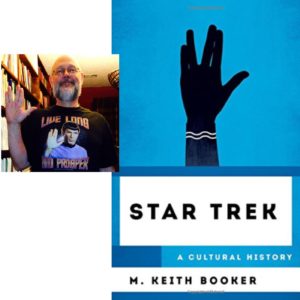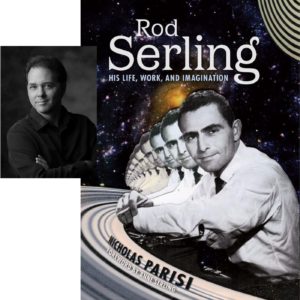Star Trek history – “Star Trek: A Cultural History” (Rowman & Littlefield, 2018) – M. Keith Booker interview
Podcast: Play in new window | Download
Subscribe: Apple Podcasts | RSS

M. Keith Booker studies and teaches culture and literature. He worked as an engineer for many years before turning to the literary arts. He also has a passion for Star Trek and “nerd” stuff and we spoke about his latest book on Star Trek.
0:43 – Keith talks about how he got into writing on Star Trek. He’s been a fan for decades and has also studied cultural history for many years. He started as an engineer.
3:43 – Keith has written on high brow literature but also on comic books, film and tv.
4:47 – Keith talks about the book and says that it focuses on the Original Series. But he also touches on the other Star Trek series’ and how the Original Series influenced them.
6:23 – Keith talks about Irwin Allen.
6:53 – Keith talks about NBC’s plans for Star Trek.
10:00 – Keith talks about the Prime Directive in the show.
13:07 – Keith talks about the writing in the Original Series and how Roddenberry reached out to sci-fi writers.
17:38 – We talk about Spock and his parents.
19:45 – We talk about the fan mail the series got.
21:08 – Keith talks about why the third season had problems.
23:40 – Keith talks about the research he did for the book.
27:40 – Keith talks about the X-files where they had stand alone episodes but also a running plot line.
31:39 – We talk about Star Trek conventions and how they came about.
34:45 – Start Trek was made for adults rather than preious sci-fi which was made for kids.
36:30 – Science fiction in general was becoming more adult in this period.
55:50 – We talk about the Coen brothers.
For more of “The Art and Design of Sci-Fi and Fantasy, Mystery and Horror” please follow me on Facebook at crisalvarezwlc, on youtube at Cris Alvarez and on Instagram @crisalvarezscifi
Guests: Keith Booker
Host: Cris Alvarez
Tags: science fiction, star trek, the original series, x-files, irwin allen, gene roddenberry, spock, discovery, CBS, NBC, lost in space
 Shawn Malley is a Canadian professor interested in the Victorian period. We talk about his latest book that discusses the intersection between archaeology, science fiction and spectacle.
Shawn Malley is a Canadian professor interested in the Victorian period. We talk about his latest book that discusses the intersection between archaeology, science fiction and spectacle. Nicholas Parisi is a musician and vocalist and serves on the board of the Rod Serling Memorial Foundation. He’s recently written a book analyzing almost all of Rod Serling’s work and we discuss the book and Rod Serling’s works.
Nicholas Parisi is a musician and vocalist and serves on the board of the Rod Serling Memorial Foundation. He’s recently written a book analyzing almost all of Rod Serling’s work and we discuss the book and Rod Serling’s works.